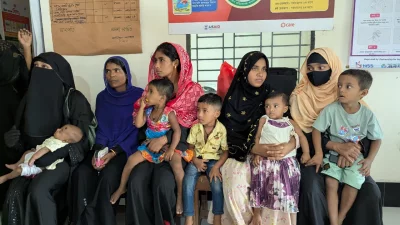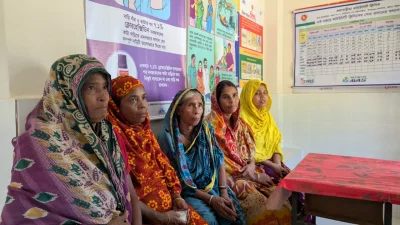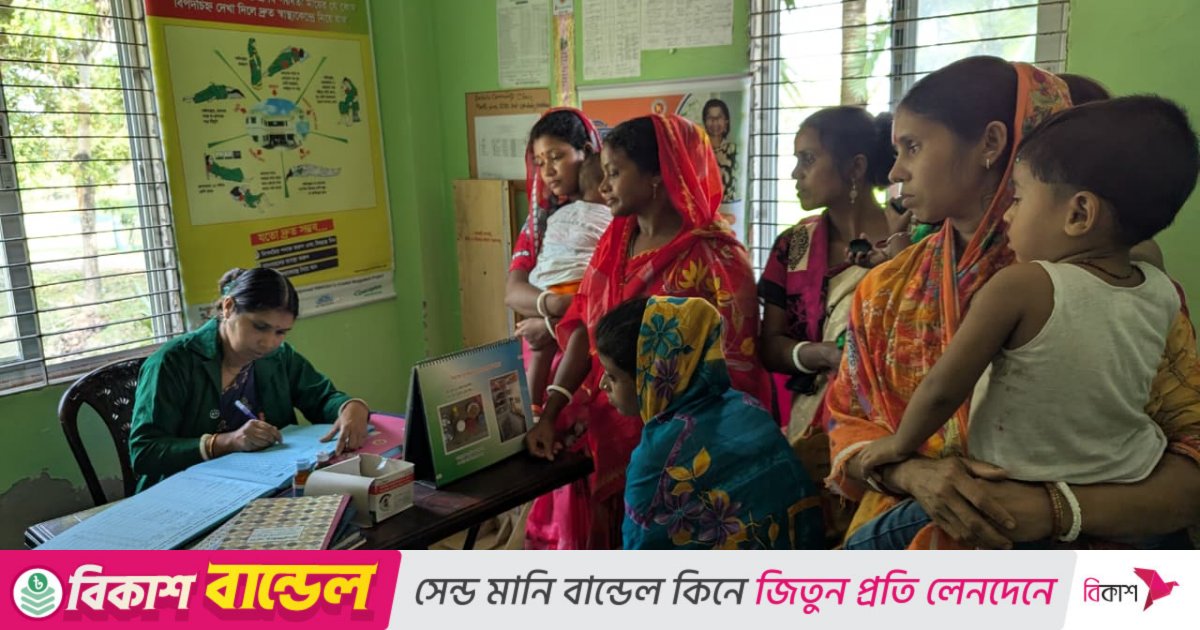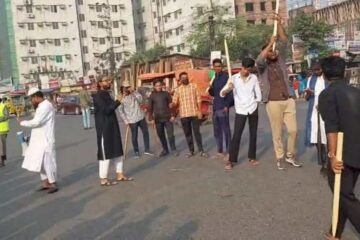There are dozens of women and children waiting for medical services at the Union Health and Family Welfare Center, Bakulbaria, Golachipa, Patuakhali. The number of people seeking care is not small, around 15 to 20 individuals.
One of them, Marufa Begum, who walked for an hour from South Sulkhala to bring her three-month-old child for medical attention, shared her experience.
She frequently visits the clinic for general health issues. Similarly, Sumi Akter arrived with her two-and-a-half-month-old child, who has a cold, fever, and cough.
“There are no doctors’ chambers nearby”, she said.
Sumi also said: “We are poor people, so we come here for treatment.”
However, the center faces significant challenges.

According to Family Welfare Assistant (FWA) Ranjita Rani, the clinic has been without medicines for over two months. As a result, the staff cannot provide the essential medications to the patients.
Despite these challenges, the clinic continues to provide essential healthcare services, such as treatment for common ailments like cold, fever, headache, stomachache, and diarrhea.
Ranjita also told Dhaka Tribune that from September 2024 to September 2025, 36 children were born through normal deliveries at the Union Health and Family Welfare Center in the Bakkulbari Union, marking an increase compared to previous years.
She also mentioned that the Center currently operates with just three staff members.
Abdul Rahim, a local tea vendor, commented that while the center previously had an ample supply of medicines, they are now facing shortages. He believes the clinic could be more efficient if it offered overnight accommodations for patients traveling long distances.
Lamia Akter, a resident of Bakulbaria, brings her 1.5-year-old child, who has an allergy issue, for regular checkups.
Lamia shared that she has been visiting the center for the past five years, seeking treatment for her child’s cold and other ailments.
In contrast, the Guabaria Community Clinic in the same region has better conditions. In this clinic, the records show that a total of 7,947 patients received services between January and September. The majority of them were women and children.
Mousumi Akter, CHCP of the Guabaria Clinic, said: “A few days ago, our medicines ran out. With support from Concern Worldwide, we received some additional supplies. So now, there isn’t much shortage of medicines anymore.”
She also mentioned that the clinic, which sees 30 to 40 patients daily, currently lacks a weight machine and thermometer. Though there was a four-month gap without medicines, the situation has improved, and the clinic now receives 22 types of medicines from the government.
With sufficient medicines supplied by Concern Worldwide, this clinic has become a beacon of hope for locals.
Additionally, the clinic underwent significant infrastructural improvements, thanks to the support of Concern Worldwide, which has tiled the facility.
Patients like Golsiara Begum, 50, who lost her husband years ago and survives by begging, depend solely on free medical services provided by the clinic. She has never sought treatment elsewhere.
Parul Begum, who visited the clinic with knee pain, shared that the services offered here have been a significant help to the community.
The local administrator of the Bakkulbari Union, Md Kausar Ahmed, mentioned that the union receives an annual budget of Tk2,50,000 for health-related expenses.
However, much of this budget is allocated for building toilets and installing tubewells in densely populated areas. So far, Tk1,00,000 has been allocated for the health sector in the 2024-2025 fiscal year.

Kausar Ahmed also pointed out that while an MBBS doctor should ideally be present at the Union Health Center, this has not been the case due to a shortage of staff. Furthermore, the available medicines are fewer than what is required.
Similarly, the Behala Community Clinic in the nearby Koraibaria Union of Barguna District faces its own challenges, such as a lack of proper equipment, like a VP machine.
However, the clinic has received a budget of Tk35,000 for health services in the last fiscal year, which was entirely spent on improving the clinic.
After months of inadequate medicine supplies, the clinic now receives regular deliveries of essential medications.
Anjali Rani, the CHCP in charge of the Behala Community Clinic, said that about 40 to 50 patients come for treatment daily.
Most of these patients suffer from common ailments like cold, cough, and diarrhea. Rani also shared that the clinic refers serious cases like dengue and high blood pressure to larger hospitals.
In the past five years, the clinic has seen a notable increase in patients with high blood pressure, largely due to the region’s high salinity levels, which also contribute to allergy issues.
In the face of these challenges, the Concern Worldwide Bangladesh project has brought positive changes to the health sector in the coastal regions.
With support from local organizations like Nazrul Smriti Sangshad (NSS) and Association of Voluntary Actions for Society (AVAS), the “Partnerships for Improved RMNCAH in Coastal Bangladesh” project is improving reproductive, maternal, neonatal, child, and adolescent health (RMNCAH).
Since January 2023, this project has provided essential healthcare training to health workers, increased community awareness, and upgraded clinic infrastructure.
As a result, there has been an increase in normal deliveries, and the overall quality of healthcare services has improved. The project will continue until December 2026, with a possible extension until June 2027.
The initiative has reduced maternal and child mortality rates and improved health service delivery. Under this project, over 1,66,000 women, children, and adolescents have received various services.
Dr Sheikh Shahed Rahman, program director of Concern Worldwide, emphasized the need for strategic planning at the national level, especially in areas with high health risks and climate vulnerabilities.
He also highlighted the importance of joint planning between the government and development partners to meet the Sustainable Development Goals (SDGs).
Dr Mejbah Uddin, the upazila health officer of Golachipa, mentioned that the local community must take a more active role in managing the community clinics.
He also acknowledged that some clinics still face challenges due to a lack of management and awareness; however, many clinics are thriving thanks to the support of the Concern Worldwide project.
The ongoing project is playing a crucial role in making healthcare more accessible to marginalized coastal populations and in building a resilient, climate-conscious healthcare system.



